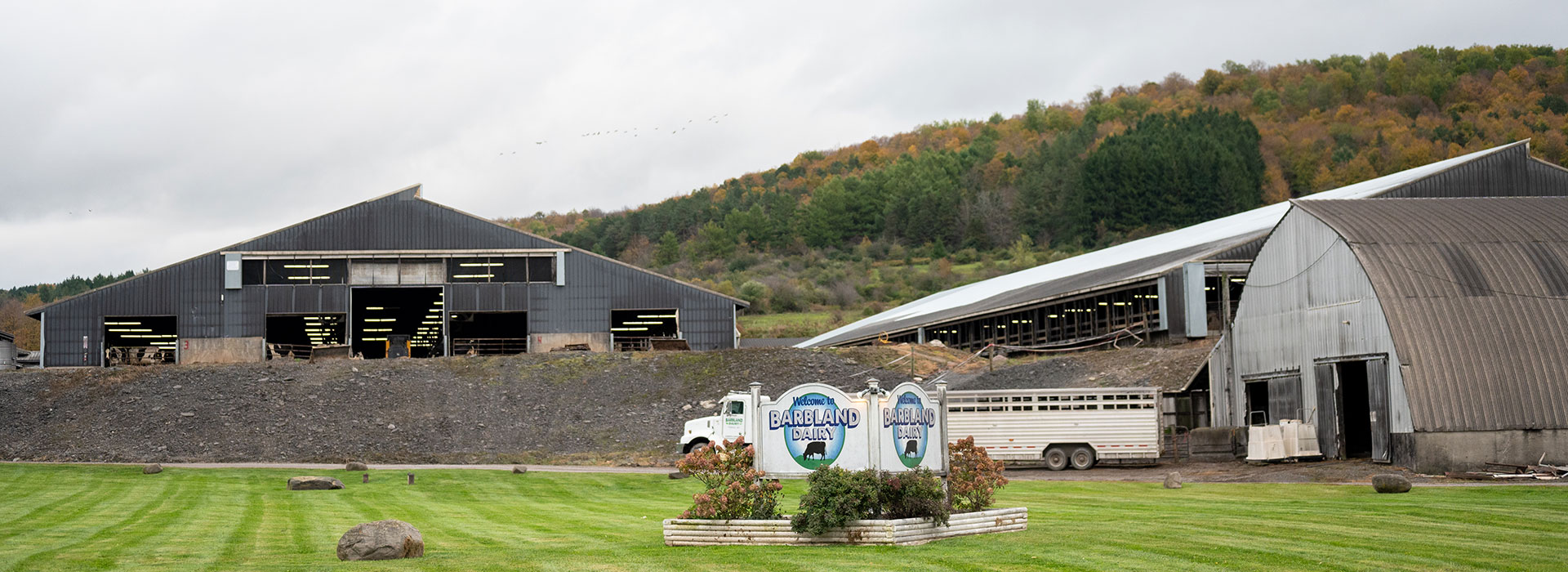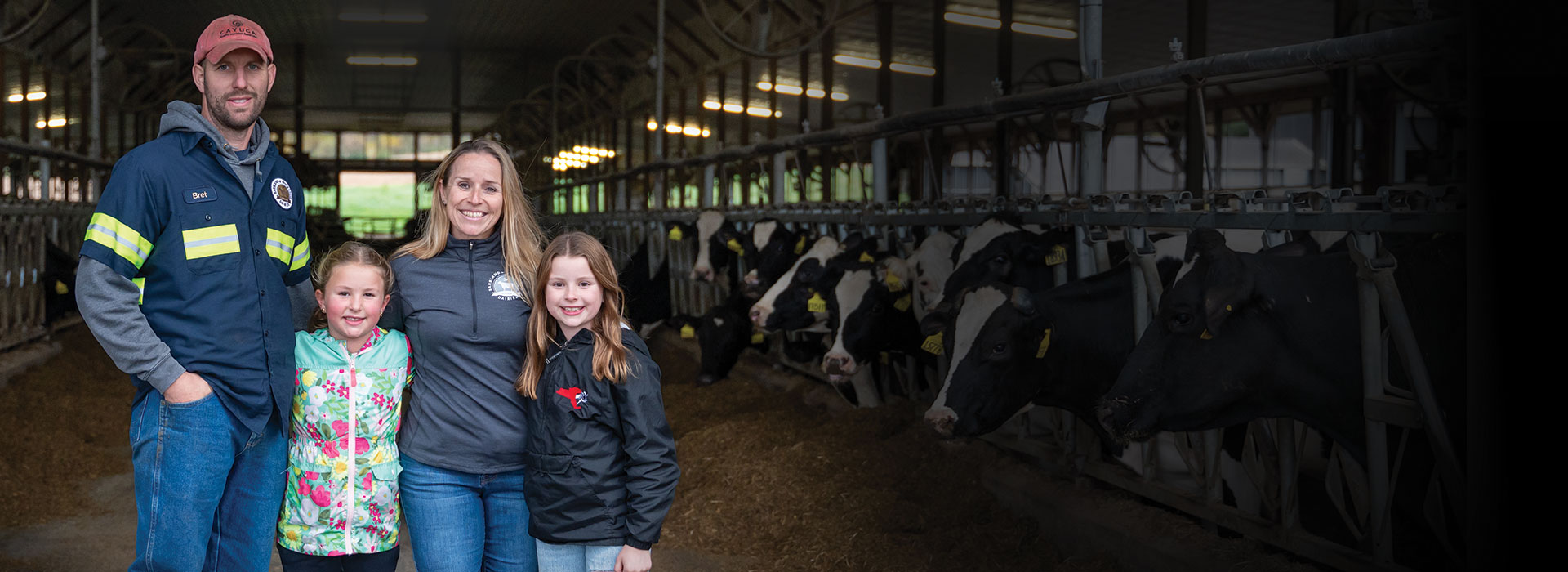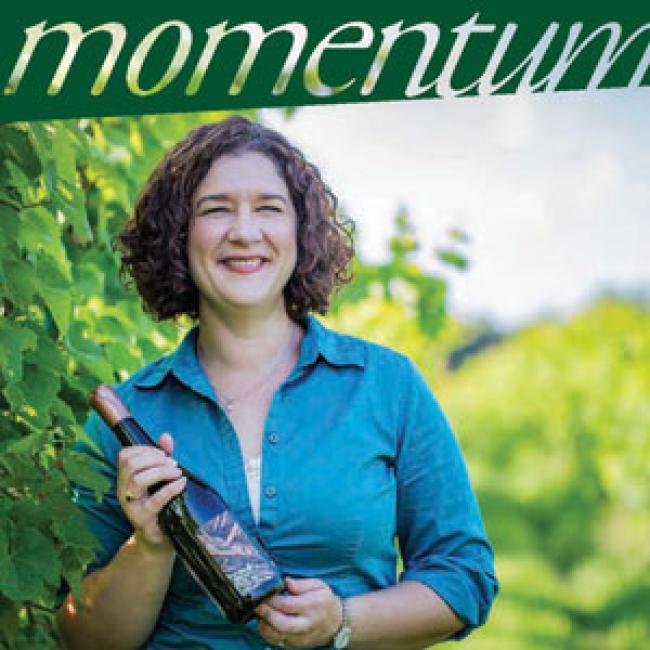When Bret Bossard ’02 and Luke Huysman ’03 were students at SUNY Morrisville, they supplemented their classwork with internships at Barbland Dairy, which began as a potato farm in the 1950s before transitioning to beef and then dairy.
Two decades later, they are co-owners of the farm with two other families, milking 4,000 cows daily and managing 10,000 acres across Central New York. More than 80 employees are part of the enterprise, including a number of Morrisville alumni and interns.
The farm has doubled twice in size since their internship days, after the acquisition of several dairy operations in the region and partnering with White Eagle Dairy of Hamilton, New York.
They’ve modernized the farm, implementing advanced technologies like activity monitors for cows, computerized herd management and precision agriculture tools.
Challenges like market fluctuations, combined with ever-rising costs, impact both small family farms and larger commercial operations. But Bossard, Huysman and their team remain focused on the lessons they learned at SUNY Morrisville to help meet the current and future needs of the dairy industry.
“Growth of our farm is what has worked to make our farm sustainable for the next generation and for the financial well-being of the business,” Bossard said.

A love of agriculture
Walking through the free stall barns at Barbland Farm in Fabius, New York, Bossard explains how connections he made at SUNY Morrisville have shaped his life and career.
He was drawn to Morrisville’s dairy program because of its class sizes and faculty connections.
“I felt like they knew me. They knew what I needed, and they wanted me to succeed,” said Bossard, who grew up on a farm in Western New York.
A different kind of connection helped create his family. He met his wife, Johanna ’04, when they were freshmen at Morrisville. After earning her bachelor’s degree in equine science, she worked for several years as a horseback riding instructor before pursuing a master’s degree in agricultural education at SUNY Oswego.
“I knew I loved to teach,” she said. “And I want to share my love of agriculture.”
Now in her fourteenth year teaching at Hamilton Central School, her curriculum includes a variety of subjects including mechanics, welding, horticulture, veterinary science, agriscience, and environmental science — a testament to the diversity of careers in agriculture. She is the school’s FFA advisor and was named New York’s Ag Educator of the Year in 2022.
“I’m not teaching kids how to only be farmers,” she said. “I get to teach our youth where their food comes from.”
Their daughters Brynley, 10, and Raegan, 7, spend a lot of time at Barbland, driving tractors with their dad and joining their mom for farm tours. They enjoy showing cows through the Holstein Association and participating in 4-H.
“We love that they are growing up here, learning from what is happening around them,” Johanna Bossard said.
A special kind of team
Co-owner Huysman started his career at Barbland Dairy in high school and continued as he pursued an animal science - dairy degree at Morrisville.
It was a family business: his grandfather was a dairy farmer and Huysman started raising heifers and calves in his parents’ barn as a teenager.
“This is what I wanted to do,” said Huysman, who has taken on the role of crop and machinery manager at Barbland, overseeing the soil health of acres of corn, alfalfa and grasses.
His three daughters, Hatley, Emmy, June and wife, Ashley, are also regulars on the farm. “They make themselves at home in the shop,” he said.
Huysman credits Barbland’s success to the dedication of their employees — many of whom have connections to Morrisville.
“We have some guys who are really good in the shop but really good with the cows too,” he said. “You don’t get that on every farm. They can handle a little bit of everything. And that’s how we make it work.”
And an ongoing connection with Morrisville faculty and students continues to help the farm move forward.
“I know they have a solid background,” Bret Bossard said. “And when you’re looking for people to hire, it’s all about drive.”

A good fit
Logan Martin ’15 and Alex Evans ’20 also started their careers at Barbland as interns and now are part of the full-time team that makes the operation successful.
Martin, an animal science - dairy major, and Evans, an agricultural engineering major, remember their days at SUNY Morrisville fondly.
“From day one, on the farm, in the barn, learning was always hands-on,” said Martin, who grew up on a small dairy farm in Western New York. “It just felt like a great fit.”
“I don’t like just studying textbooks,” agreed Evans, who grew up on a 70-head dairy farm in Norwich, New York. “We were out in different fields, we were working on equipment, we were always doing something hands-on.”
Their roles at Barbland keep them busy. Martin oversees feed and milk quality and Evans helps maintain equipment.
The management skills they fostered at Morrisville have merged with the technology they use daily to maintain herd and crop health.
It’s all part of precision agriculture that is helping Barbland enhance efficiency and reduce resource usage — like using GPS for accurate field mapping and harvesting, nutrient mass balance to efficiently utilize soil nutrients, sensors for monitoring crop conditions and data analytics to optimize farming practices.
“The basics of managing a herd of cows is the same,” Martin said, “but there’s always something new to learn to improve how it all works.”
“Technology is the future,” Evans said. “We learned some of it in the classroom, but we grew our knowledge on the job.”

Back in the field
The newest addition to the Barbland team, Joel Vollmer ’20 pursued his bachelor’s degree in agricultural business development to learn as much as possible about the industry.
“I always knew I wanted to be involved in farming in some way,” said Vollmer, whose parents are also Morrisville alumni.
His first job after graduation was as a crop consultant with a fertilizer company, serving more than 100 farmers.

“Feeding their crops different nutrients — making sure it isn’t too much for too little,” he said. “Keeping weeds out and making sure the crops stay healthy.”
His Morrisville networking connections brought him to Barbland, where, as assistant crop manager, he can use his soil analysis skills to help determine crop rotation and also spend time in the field.
“Now I’m able to do some field work and also the science and technology side of it that kind of tickles your brain,” he said. “It keeps things interesting, doing something different every day depending on what is needed.”
About the cows
The cows at Barbland and White Eagle Dairies are milked three times and produce about 10 gallons of milk every day. During its life span, each cow will produce enough milk to fill a tanker truck.
Each cow consumes 120 pounds of food every day — enough to fill a 55-gallon drum — and drinks more than 40 gallons of water — enough to fill a bathtub.
Barbland Dairy ships about three tractor-trailer tankers each day — each one holding about 9,000 gallons of milk. Most goes to the Chobani yogurt plant in Otsego County, as well Midland Farms in Albany, the Byrne Dairy processing plant in Syracuse and Cayuga Marketing, a milk co-op in Auburn, New York.


